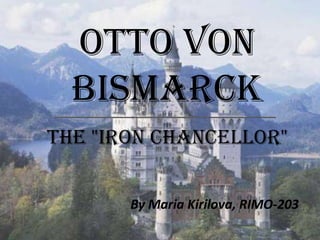
бисмарк
- 1. Otto von Bismarck the "Iron Chancellor" By Maria Kirilova, RIMO-203
- 2. Childhood and Otto von Bismarck (Eduard Leopold von adolescence Shenhauzen), the third son of a Prussian landowner, was born in 1815 in the family estate in Brandenburg. During the studying Bismarck was interested in the politics of past years, the history of military and peaceful rivalry of different countries. Leaving high school, Otto studied law at the University of Göttingen. There he gained the reputation of revelers and a fighter, gambled and drank a lot. After graduation, he joined the Guard Jaeger Regiment. In addition to his military duties Bismarck studied the methods of animal breeding.
- 3. Bismarck - In 1839 Bismarck’s mother landlord died, which did not make a strong impression on Otto. However, this event determined what he should do after military service. Otto helped his brother to farm the estates and took the lead over family ownership.
- 4. Bismarck - landlord Bismarck studied accounting, chemistry, agriculture himself. He was a clever and practical landowner and the estate’s value considerably increased. But Otto could not be just the landlord. He shocked neighbors by his behavior. Sometimes playing cards Otto lost everything he saved for months. Neighbors called him "crazy Bismarck" for his violent temper. But "Mad Bismarck" surpassed his neighbors in intellect.
- 5. Entering politics Bismarck became known for his conservative position in the constitutional struggle in Prussia in 1848-1850. He supported King Friedrich Wilhelm IV, capitulated to Austria and Russia. In 1851 the King appointed Bismarck a representative of Prussia in Federal Seym in Frankfurt-am-Main. There Bismarck came to the conclusion that war with Austria was inevitable, if Prussia took a dominant position in the united Germany, that indicates his political insight and vision.
- 6. Gradually Bismarck’s views were Entering politics becoming more and more far from the views of the King. In 1859 Otto was relieved of his duties and sent as a messenger to St. Petersburg. There Russian Minister of Foreign Affairs Prince Gorchakov supported Bismarck in his efforts to diplomatic isolation of Austria and then France. Gorchakov predicted Bismarck great future.
- 7. In Russia, Bismarck learned Russian and spoke rather well. He understood the peculiarity of Russian way of thinking that helped him in the future in choosing the correct political line towards Russia.
- 8. In 1862, Bismarck became Prime Bismarck - Minister- Minister, later - the Minister- President of Prussia President and Minister of Foreign Affairs of Prussia and held military reform. The policy of Bismarck led to three wars: • with Denmark in 1864, • with Austria in 1866 and • with France (the Franco-Prussian War of 1870-1871.) Bismarck emphasized: "The great questions of the time will be solved by blood and iron".
- 9. Bismarck - Minister- President of Prussia When Prussia began to win over the French victory after victory, none of major European countries supported France. This was the result of Bismarck’s diplomacy, managed to achieve the neutrality of Russia and England. Bismarck's foreign talent was in the ability to build a policy on the use of the contradictions between European states.
- 10. In 1871, in Versailles, William I Bismarck - Chancellor appointed Bismarck Chancellor of the of the German Empire German Empire. "Iron Chancellor" reformed German law, management and finance. Education reforms of 1873 led to the conflict with the Roman Catholic Church. Schools were separated from the church, civil marriage was introduced. Bismarck introduced favourable domestic rates and regulated taxes skillfully.
- 11. During Bismarck’s management Germany Bismarck - Chancellor began to turn into a colonial empire. of the German Empire His economic and financial policies was consistent with the interests of the German industrialists and large landowners. Chancellor introduced the system of state sickness insurance in 1883. German engineers were the best in Europe, and craftsmen worked around the world.
- 12. Bismarck - Chancellor When William II became the king in of the German Empire 1888, Bismarck lost the control over the government and resigned. He received the title of Duke and was awarded the rank of colonel of cavalry. Being retired Bismarck published his memoirs, which were of great success. He continued to interfere in the current policy, taking an active part in the press campaigns.
- 13. "Iron Chancellor" died in 1898 and was buried on his estate Friedrichsruhe. On the tomb there was the inscription: "Faithful servant of the German Kaiser Wilhelm I". Bismarck ‘s "Thoughts and memories" (Gedanken und Erinnerungen” is a literary monument to him and "Big Politics European offices" (Die grosse Politik der europaischen Kabinette) serves as a monument to his diplomatic skills. There are Bismarck monuments in all major cities of Germany, streets and squares are named after him. He was called Reichsmaher - «the maker of the empire", "the creator of the nation."
- 14. Links • http://www.flickr.com/photos/fuglylogic/3485589101/ • http://www.fsmitha.com/h3/h49-bis7.htm • http://www.military-quotes.com/otto-von-bismarck.htm • http://worldcat.org/identities/lccn-n79-18384 • http://suite101.com/article/the-impact-of-otto-von-bismarck-a193226
